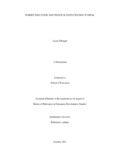
Please use this identifier to cite or link to this item:
https://hdl.handle.net/20.500.14301/286| Title: | WOMEN EDUCATION AND POLITICAL PARTICIPATION IN NEPAL |
| Authors: | Dhunge, Laxmi |
| Citation: | Dhunge |
| Issue Date: | Oct-2013 |
| Publisher: | Kathmandu University School of Education |
| School: | SOED |
| Department: | DODE |
| Level: | M.Phil. |
| Program: | MPhil in Development Studies |
| Abstract: | Women and their political participation in Nepalese context have been a challenging issue for feminist studies because there lies less women representation in the decision making level of Nepalese politics. Nepal has not witnessed any top women leadership till this data. Even if we see the major political position held by women leaders, it is scanty. Hence I am interested in such research wishing to see the participation of women in development activities. Nepalese women have been suffered by gender discrimination. There are many issues related to such discrimination. Moreover, several important issues for women empowerment are unexplored. Nepalese women are facing so many difficulties in this patriarchal societal structure. Their primary concern so far has been about achieving equitable society. However, only limited attempts have been made in their favour. Women’s position and participation in decision making level is hopelessly minimized though we talk a lot about development. In this context women’s political participation has always been a challenging phenomenon. The cause of all these concerns is nothing more than the gender discrimination. In the meantime, education ii for women in itself is a challenge for them. Why is this prejudice in our context? What wrong have they done being women? Why is our social structure giving injustice to women? In this scenario, I have designed a framework considering these questions. My attempt in this research is to see the level of women’s participation and their understanding in education, identity, encouraging and discouraging factors for their involvement in politics. I have involved myself as a participant in this research and expressed my reflection. I have observed Nepalese society through my perspectives, where I have shared my experiences under many topics. I have also tried to explore understanding, knowledge and experiences of women who are educated and uneducated, politically involved and not involved. I have used feminist research methodology in this research where I have often played the role of participants and put forward my point of view regarding women’s political participation. The feminist theory in my research advocates women’s participation and their freedom. I have discussed their problems into an academic arena through this research. I have also mentioned how women are dominated in this socio- cultural context. My research approach is qualitative. I have tried to incorporate critical, interpretive and narrative approaches. In this context, I have raised certain questions against women’s discrimination through critical approach. Besides, I have used interpretative paradigm to address the issues of my respondents, whereas my experiences have been included through narrative analysis. For this research, I have designed a framework raising the issues of women’s political participation and education in Nepalese context. From this research, I have found that the perception of women is in the process of change and they want to come out of the existing traditional gender roles. At the same time I have observed many challenges on them which they wish to overcome |
| URI: | https://hdl.handle.net/20.500.14301/286 |
| Appears in Collections: | Dissertations |
Files in This Item:
| File | Description | Size | Format | |
|---|---|---|---|---|
| LAST LAXMI 2013 OCTOBER 18 THESIS (1)..pdf | 1.14 MB | Adobe PDF |  View/Open |
Items in DSpace are protected by copyright, with all rights reserved, unless otherwise indicated.